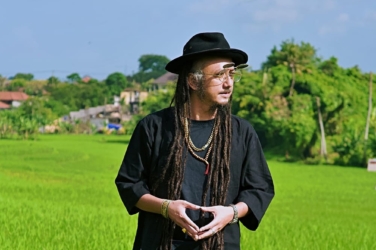Our guest this time was one of the finest French producers and a witty beatmaker. From a young age he was exposed to music, something that kept him busy and helped him grow. His love for digital reggae is huge. His exploration through his works of art slowly became his signature. Through a phone line, this now-a-prominent-acts-in-the-world of reggae told kultur about his new album, an album containing the history of Jamaican music that he is passionate about working on. His musical journey, and sharing his spirit to others to stay positive in this recent situation.
Can you tell us some background on this, do you choose the songs by yourself or from Rastar Records?
Well, this collaboration started one year ago. During the first quarantine (in France), Naciamaj Uhuru (A nephew of Duckie Simpson from Black Uhuru) was the one who contacted me through facebook. He told me about Rastar Record, all its catalogue and unreleased materials from many many music legends from Jamaican. He asked me about the possibility of doing a collaboration to bring a new release from the library of Rastar Records. At the beginning, I was like, you know, sometimes you have strange questions and strange requests from social media (laugh). But in the next few minutes, I received a ton of files. A very massive collection. Some of them are complete tracks with the original music, some of them are acapellas. There’s Yami Bolo, Mykal Rose, Gregory Isaacs and many more. It’s a WOW to me. After that we selectively choose to keep only 12 tracks for this vol. 1 together, because maybe we’re gonna do the second volume and so on.
It’s indeed historical, right?
Definitely! Yeah, Indeed! It’s like you know, to me (The artists on the album) these are my heroes in the reggae scene.
You have the privilege to open these valuable archives and have freedom to interpret them on your own. What’s the highlight from this production?
It takes a few months for me to rebuild the music, recompose and spend a month. These are big tunes you know, the vibe was amazing. These are the ones that inspired me to make music. I did lots of collaborations before, with many Jamaican artists too. But this project is different. It’s about Jamaican music history. These are the tunes (that were recorded) when reggae music was huge in Jamaica. Roots reggae music in Jamaica now is totally changed. You can find roots revivalist artists and some dancehall hardcore artists now. And what’s important to me is, this project can be a “bridge” between two cultures, Jamaican and French.
And do you have the most memorable things while you are doing this in your studio?
Of course, I do have it. (laugh). It’s very nice and amazing at the same time to open this kind of files, vocal data of the legends. On the track “The Soul Of Ethiopia” by Greggory Isaacs, I’ve got my own joy and happiness in a good vibe and memory. Because I remember I once saw him performing in french when I was young. I saw him with many blinks on his neck. On these files and acapella data, I can hear the sound of his blink on his neck while he sings the refrain (hardly laugh). And through these kinds of files, I also can learn about the vibe of Rastar Records and Jamaican music industry at those good times even though I wasn’t there.
Between all of the songs on this Rastar set, do you have any favorite?
Well, I really love all the tracks in this LP. That’s why I recompose them. But I like “Yaad Through” with Mykal Rose, because I am a huge fan of Black Uhuru. It’s nice to do my own journey on that track. Also “Make It In Time” with Akae Beka, a crazy moment to be able to do this. And yeah, Yami Bolo and Junior Reid as well. Love all of them.
We wonder, Mykal Rose & Yami Bolo really did inspire you a lot?
True, they inspired me a long time ago. I love all the “Waterhouse style” music from the corner of Jamaica. King Jammy’s. They are a part of reggae music. Again, I am a huge fan of “Waterhouse” in the 80’s. I enjoy everything from this kind of reggae, my favorite part of reggae music itself.
About Gregory Isaacs, if he’s still here, what will you say to him about your version of “The Soul Of Ethiopia”?
(Laugh so hard) I don’t know. (laugh) I don’t know man. (laugh). Too many. Too many questions I’d like to ask him. One week with him alone won’t be enough to get the answers for my own questions (laugh). But maybe, I’d like to hear how he lives his career from day one.
With Mykal Rose in this album, and the touch you did on “Cut them off” (reloaded), It’s so “Black Uhuru-esque”. What’s your fav from Black Uhuru? and will you release your own version from that?
(laugh) It’s difficult to choose! (laugh). Black Uhuru is one of the best reggae bands in the world. And they are special to me. We haven’t seen that kind of band until now right? (smiles). “What Is Life?”, “Happiness”, “Guess who’s coming to dinner” and “Solidarity”. Wish I could remix them (laugh). Hopefully, we’ll never know, right? (laugh)
Okay, can we have the story about what brings you to music for the very first time?
Very first time? Okay. I started music when I was 12. It was a guitar that I learnt. Because my brother (Pokito, who also supports Manudigital on this album. -ed) played guitar. And I was trying to mimic him with a guitar (laugh). But after a few months, my brother told me to change the instruments, and asked me to join him on a band rehearsal to do cover versions from the likes of Nirvana, Rage Against The Machine, Metallica, and Iron Maiden. After that ,I joined another band, ones who played reggae music. I’ve got several cassettes of Bob Marley and Black Uhuru from them as well. But It wasn’t a band who does the industry kind of things. But all the members from this band still have their own career in France that is still connected to reggae music.
Quite a journey, isn’t it?
Yeah, I think so.
And was it true that you ever attended a jazz music school?
Yes, It’s true. I attended “American School of Modern Music” in Paris. It happened many years after I started learning music from the first time. It was my family that suggested me to attend a music school after I told them that I want to play music as my way of live. By doing a little work, I could save my own money to pay the school. So yeah, I enjoy my four years in music school. It’s interesting, I learn alot about jazz. But well, I am not a jazzman! (laugh)
Can we hear something that you have learnt from jazz music school into your works?
The school wasn’t always about musical impressions. It gave me an insight about how to get into the music business. And how to be disciplined as a musician.
Some kind of attitude?
Yup! Attitude. Before I attended school. To me, it’s enough to play bass for 2-3 days a week. Everything started to change after that. I keep on practice materials I have from the school, day after day, night after night. Stay focused on music. On your ideas. All about relations in your music.
As a bass player, do you always start with a bassline?
Not always. It might come from anything. Drum pattern, keyboard and maybe from a humming.
“Digital Pixel” is a classy touch from Manudigital to me. We can underlined “Saudade” (Flavia Coelho), “Look at The Tree” (Errol Dunkley), “Already Midnight” (Marina P), and “Politiks Man” (Soom T), also “Crazy” (Taiwan MC) Anything you can tell us about your own solo debut?
Thank you very much! Yeah, it’s the beginning of my personal career. Before that, I was just producing music for a couple artists. Also a side man for many bands as a bass player or keyboard player in lots of gigs. Then I also was a part of one of French reggae bands called Babylon Circus. I made “Digital Pixel” just in a month. It’s really fast, indeed. First week, I finalize all the compositions. The next stop was quite easy, because I know all of the artists personally (except Errol Dunkley), they are my friends. Then I did a little change on the music after the vocal session with the singers. Went to the mixing studio, and all was done. But well, “Digital Pixel” was a child from my thought to see what kind of career I should have. I’d like to try a new path for my musical journey. I was thinking, if this debut can’t go well, I’ll stay as a supporting musician for other artists.
A different energy from Manudigital, but here you are now.
(laugh) Yeah. Here I am. Yeah, Definitely different energy.
Working with lots of singers for your collaboration is something that makes your works sound wider. How did you start, did you try to find the singer for your music or you make a music for a singer that you like?
Interesting! I like to make an instrumental version. I make one or two instrumental versions in the studio everyday. After a week, I try to pick the best ones, selecting and compiling this part and that part. Then when I’m done, I send the instrumental version to the singer or I go to the studio with the singer to record the song. Then back again to my studio to do a retouch on them. Sometimes, the interpretation from the singer is different with the vibe I created in the song, but this always gives me different inspirations. Between the music and the vocal is not about “music is on the left and the vocal is on the right”. It is very important to keep the relationship between the music and the vocal. To create the music around the vocal part is to put up the level of the vocal with the music.
You’re enlisted as one of the roster from one of the massive “Jamaican sound” related labels, X-Ray Production. What makes you happy to be part of them?
(Laugh) In the music you have two different parts. Your relationship with the music and your relation with the business. I for this case, don’t want and never mixed those two. I’m happy to be part of them because they always help me to just do the best on my relationship music part and let them do the business for me. I’m honoured to be this part of the family. All the roster here knows each other, it’s a family to me.
Last question, regarding this situation we are facing right now. Do you have any thoughts you’d like to share for your Indonesian fans?
Making music and making people happy is a very important thing to me. But I don’t know what will happen in the next couple years, maybe a better solution is more than just a vaccine. But I’d like to say to all my friends in Indonesia to stay positive, stay strong and make sure that the future is gonna be alright for us.
(reporter:sam)










Show Comments (0)